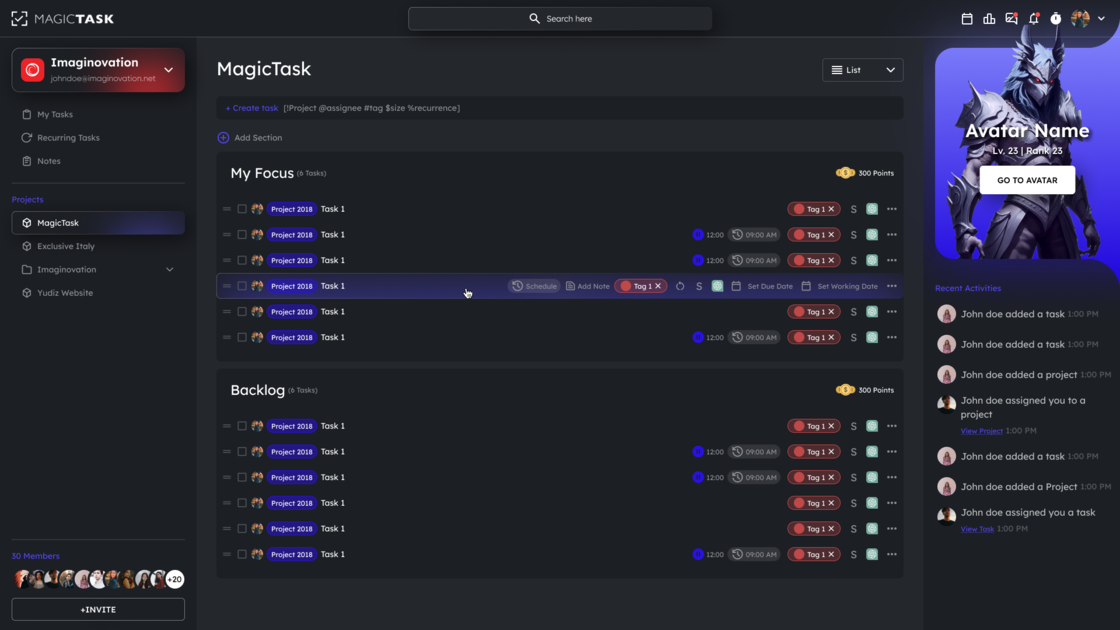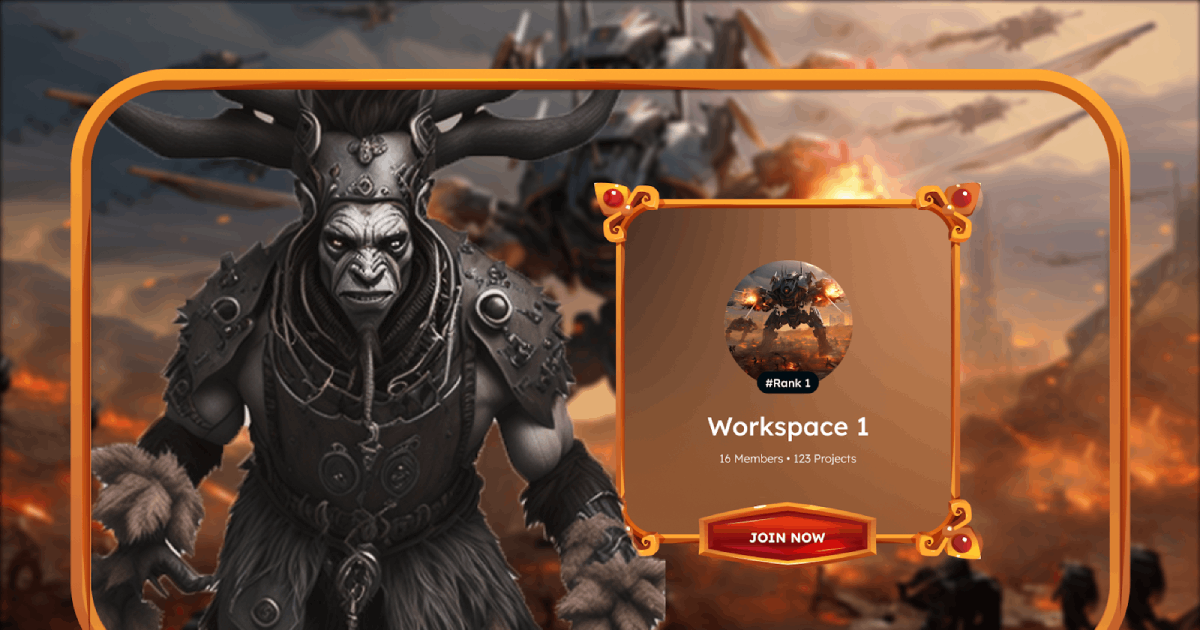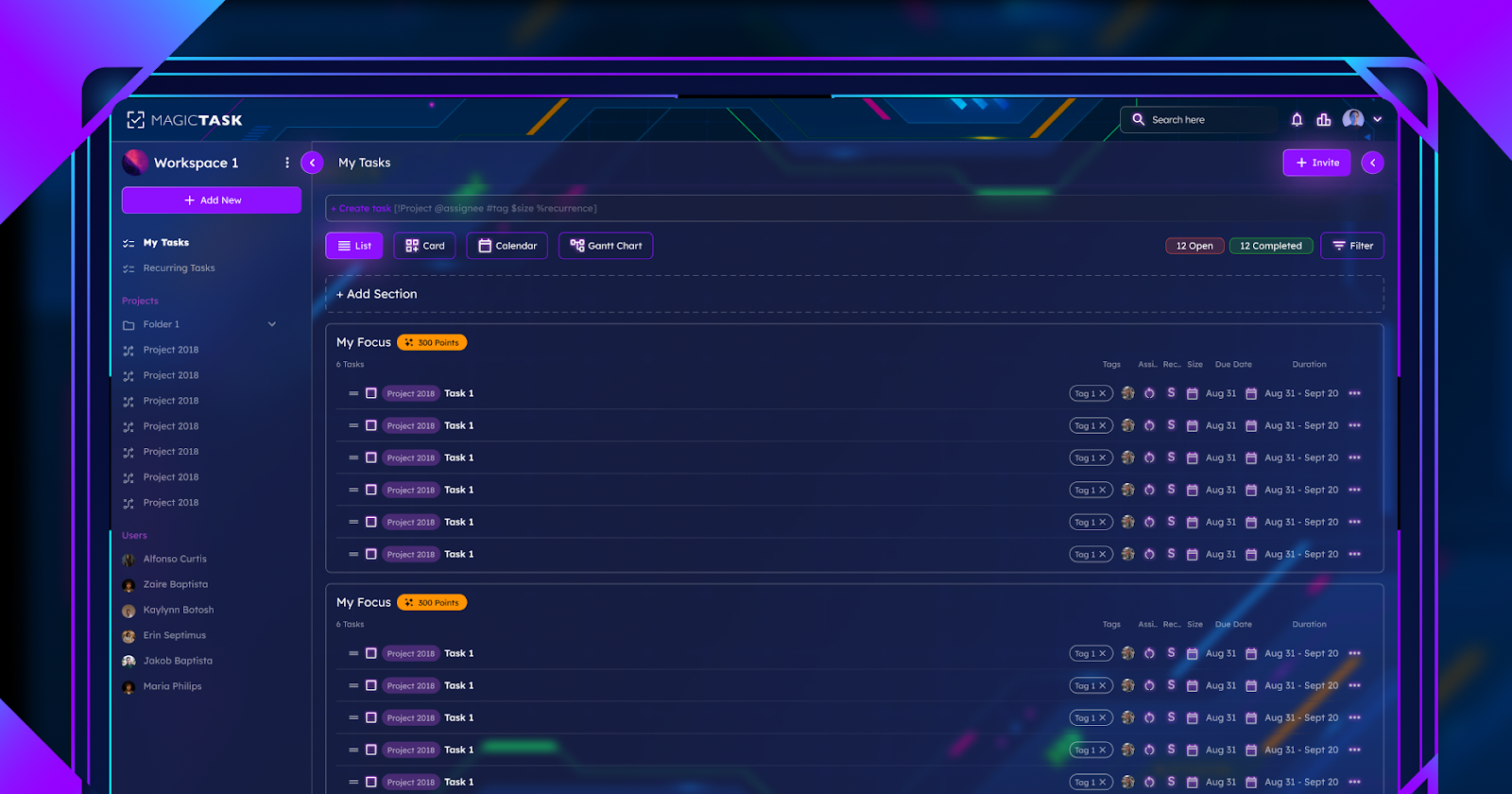20 Productivity Hacks to Get More Done in Less Time
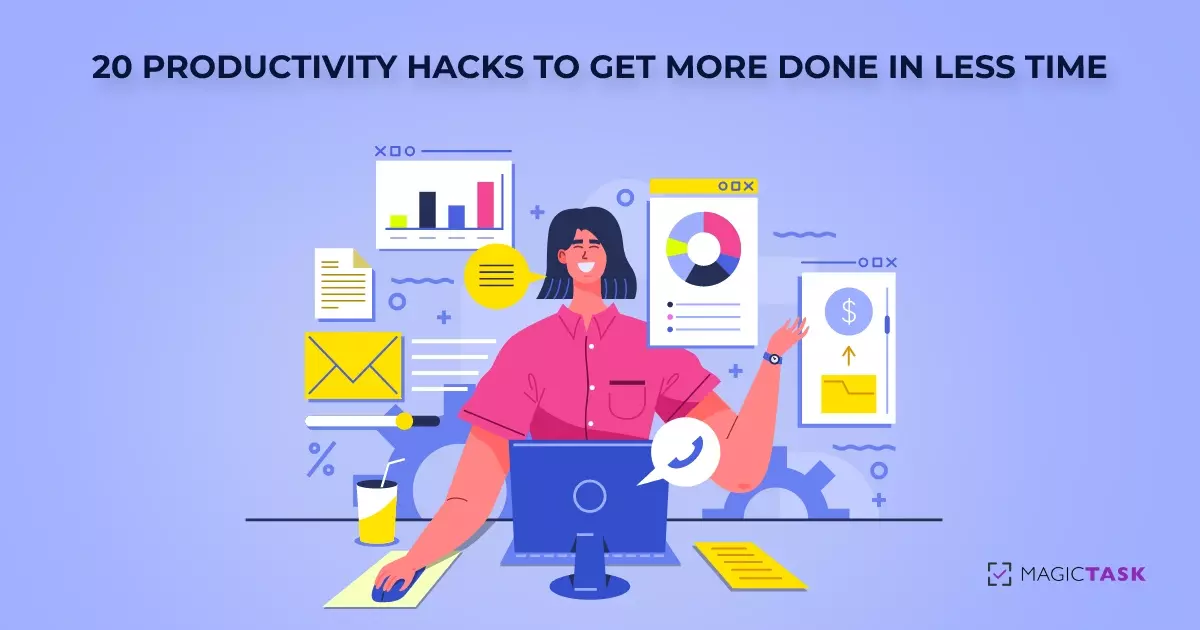
In today's world, it is essential to be productive. The competition is fierce, and the economy is uncertain.
To stand out from the crowd, you need to be able to get things done quickly and efficiently.
This blog post is a compilation of some of the best productivity hacks that are guaranteed to help you get more done in less time.
From establishing a clear and achievable routine to taking care of your physical health, these easy tips and tricks will help you become the most productive version of yourself.
1. Plan Your Day
The first step to being productive is to plan your entire day ahead of time. You should be on top of everything you want to finish on that day and ensure you don't miss anything.
A task management tool can help you stay on top of your commitments and ensure you don’t forget any important tasks.
There are all sorts of task management tools available, so find one that works best for you and your needs.
2. Simplify Your To-do List
A never-ending to-do list can be overwhelming and make it seem like you’ll never get anything done.
To simplify your to-do list, start by brainstorming everything that you need to do. Then, prioritize the items on your list and only keep the most important ones. As you complete tasks, cross them off your list so that you can see your progress.
Task management apps and tools are very useful options for creating clear and simple to-do lists. Here, we would recommend MagicTask.
For example, Apps like MagicTask help you track all projects, tasks, and subtasks in one place.
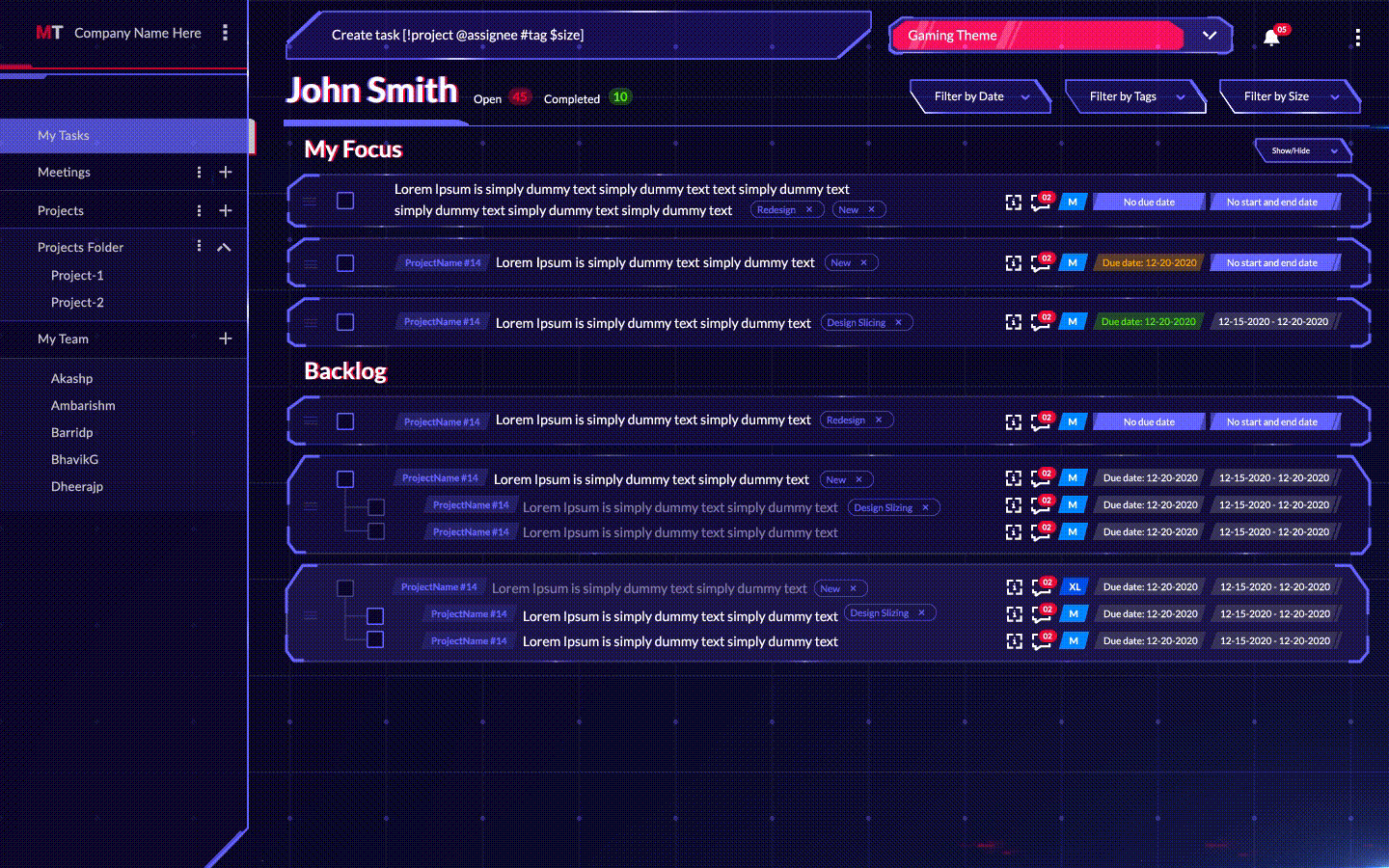
Good task management tools allow you to easily and quickly jot down reminders and tasks and should also have a clear and simple interface that doesn't make things feel cluttered.
3. Keep Your Workspace Tidy
A cluttered and chaotic workspace can be very distracting and can lead to a decrease in productivity. Here are a few tips on how to keep your workspace clean and organized:
- Make a habit of putting away all your belongings when you finish using them. It includes pens, paper, folders, etc.
- Create designated storage spaces for everything, and make sure to put everything back in its place after use.
- Invest in good-quality storage containers or organizers – this will help you better track things and take up less space.
- Keep only the essentials on your desk – this will help minimize distractions and allow you to focus on the task.
- Dust and vacuum your workspace regularly – this will help keep it looking neat and tidy.
4. Break Down Big Tasks
Big projects can seem daunting, but they’re much easier to tackle when you break them down into smaller tasks.
For example, if you need to write a paper, start by brainstorming ideas, then outline your main points, and finally write the body of the paper.
Taking it one step at a time and applying all the proper productivity hacks will make the process less overwhelming and more manageable.
5. Take Breaks
Working non-stop can actually be counterproductive. When you take breaks, you’re giving your mind a chance to rest and rejuvenate so that you can come back to your work refreshed and ready to focus.
Try to step away from your desk for a few minutes every hour or so, even if it’s just to stretch your legs or grab a quick snack.
6. Eliminate Distractions
All sorts of things can distract you from your work, including social media, emails, phone calls, and even people walking by your desk. If you want to be productive, it’s essential to eliminate as many distractions as possible.
If you’re struggling to focus, try working in a quiet place where you won’t be interrupted. Turn off your phone and close any tabs that aren’t related to what you’re working on. If you need to, put on headphones to block out any external noise.
7. Set Achievable Goals
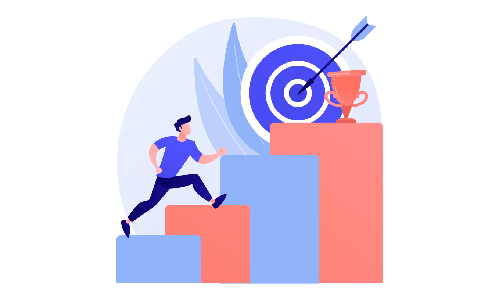
Setting realistic goals is essential, so you don’t get discouraged. If you place your sights too high, you may find yourself feeling overwhelmed and struggling to make progress.
Start by setting small, achievable goals you can complete within a reasonable timeframe. As you check items off your list, you’ll start to feel more motivated and confident in your ability to accomplish more significant tasks.
8. Delegate Tasks
In many cases, it’s better to delegate tasks than to try to do everything yourself. If you have team members or employees, assign tasks based on each person’s strengths and capabilities.
This will free up your time and ensure that the task is handled by someone best suited for it.
9. Learn to Say "No"
It’s easy to get overwhelmed when you’re constantly saying yes to things. Whether it’s taking on additional projects at work or agreeing to volunteer for a local event, sometimes you need to know when to say no.
Saying no doesn’t make you a bad person. It just means that you’re prioritizing your time and energy. If you feel stressed or overworked, take a step back and evaluate your commitments. From there, you can start to say no to the things that aren’t truly necessary.
10. Set Deadlines
Setting deadlines for yourself can help you stay on track and avoid procrastination. When you know that you need to complete a task by a specific date, you’re more likely to focus on it and get it done in a timely manner.
When it comes to setting deadlines, it’s important to be realistic. Don’t set yourself up for failure by giving yourself an impossible deadline. However, you also don’t want to give yourself too much time, as this can lead to procrastination.
There are a few different ways to set effective deadlines:
- Deadline by task: This is where you put a deadline for each individual task. For example, you might give yourself one day to finish a project.
- Deadline by date: This is where you set a deadline for a project as a whole. For example, you might give yourself one week to finish a project.
- Goal deadline: This is where you set a deadline for a goal that you want to achieve. For example, you might give yourself six months to save up for a vacation.
- Be specific: Don’t just say, “I want to finish this project by the end of the month.” Say, “I want to finish this project by June 30th.” This will help ensure that you stay on track.
11. Set Goals
Staying on track and productive is easier when you have specific goals in mind. Otherwise, it can be easy to get sidetracked or become unfocused. To set goals:
- Start by brainstorming a list of things you’d like to accomplish.
- Narrow down the list and choose 1-2 goals you’d like to focus on now.
- Once you have your goals, create a plan of action for how you’ll achieve them.
12. Avoid Multitasking
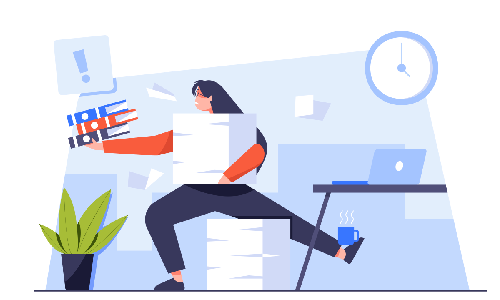
Human brains perform efficiently when we concentrate on one task at a time; in most cases, multitasking reduces efficiency and performance.
Multitasking can also leads to mistakes, so it is always better to focus on one task or one thing at a time.
13. Do Digital Decluttering
Like physical clutter, digital clutter can harm our productivity and sense of well-being. Studies have shown that a cluttered work environment can lead to stress and anxiety.
Digital decluttering is getting rid of excess files, emails, and apps on our screens and devices. By decluttering our digital spaces, we can improve our productivity, focus, and sense of well-being.
14. Automate Tasks
If some regular tasks are time-consuming and can be automated using templates or automation tools, please do it.
Automating such tasks can save a lot of time which you can utilize for other important work.
15. Use a Calendar
A calendar can help you keep track of your commitments and ensure you don’t overbook yourself. All sorts of calendar apps are available, so find one that works best for you.
Some people prefer digital calendars, while others prefer physical ones. Experiment with different options until you find what works best for you.
16. Listen to Productive Music
Studies show that music is an excellent therapy to help maintain focus and stay productive.
The type of music can differ from person to person. For example. some people might like upbeat music, while some people might like slow lofi soundtracks.
Choose music of your taste that helps you focus while working and then work on your tasks.
17. Batch Tasks
You can be more productive by batching similar tasks together.
For example, if you need to make phone calls, try to make them all at once rather than spreading them throughout the day. This will help you save time and avoid having to switch gears constantly.
18. Take Time For Yourself
It’s important to take time for yourself so you don’t burn out. When you’re constantly working, it can be easy to forget about taking care of yourself.
Make sure to schedule in some “me” time each week, even if it’s just for an hour or two. During this time, you can do something that you enjoy, such as reading, taking a walk, or listening to music.
19. Get Enough Sleep
It’s important to get enough sleep so that you can function at your best. Most adults need between 7 and 8 hours of sleep per night. If you’re not getting enough rest, you’re likely to feel tired and groggy during the day, which can make it difficult to focus on your work.
- Establish a regular sleep schedule – Try to go to bed and wake up at the same time each day. This will help your body get into a routine and make it easier to fall asleep.
- Avoid caffeine and alcohol before bed – Caffeine can keep you awake, while alcohol can disrupt your sleep cycle. Try to avoid drinking anything with caffeine or alcohol in the hours leading up to bedtime.
- Avoid watching TV or using electronic devices before bed – The blue light from screens can interfere with your ability to fall asleep. Try reading or winding down before bed instead.
- Get some exercise during the day – Exercise can help you sleep better at night. Try to get at least 30 minutes of exercise each day.
20. Eat Healthy

What you eat can also impact your productivity. When you’re feeling sluggish, reaching for unhealthy snacks like candy or chips may be tempting. However, these foods will only give you a temporary energy boost before causing you to crash.
Try to eat foods that will give you sustained energy throughout the day, such as fruits, vegetables, whole grains, and lean protein.
Conclusion
There are a lot of things to consider when it comes to productivity. But by using the hacks we've talked about in this blog post, you can start getting more done in less time.
Whether you're looking for ways to manage your time better or strategies for staying focused, these tips will help you get more out of your day.
So what are you waiting for? Start hacking your productivity today!
